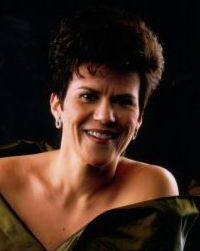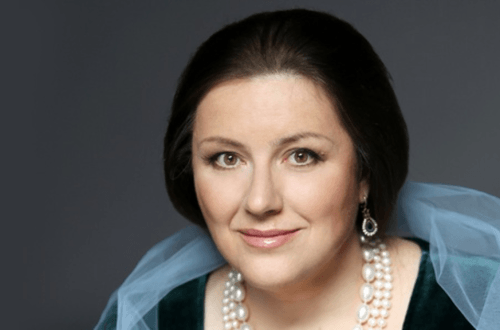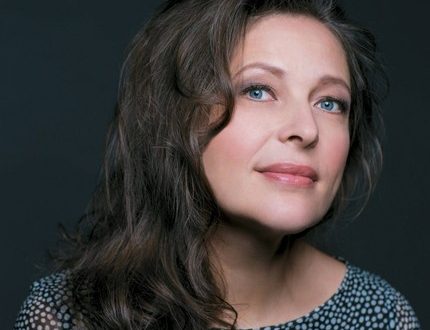
Соиле Исокоски (Soile Isokoski) |
Soile Isokoski
Little Finland, rich in its musical traditions, has given the world many wonderful singers. The path “to the stars” for most of them goes through their studies at the Academy. Sibelius. Then – the prestigious national vocal competition in Lappeenranta – it was this competition that became the launching pad for singers such as Karita Mattila, Jorma Hünninen, and Martti Talvela was its first winner in 1960.
“A star…”, — the “silver soprano” Soile Isokoski philosophizes today, — “… in the sky the stars are so far away, out of reach…” She didn’t even think about the profession of an opera singer, and even more so a career in her “star version”. He spent his childhood in the far northern Finnish province of Posio. Her father was a priest, from her mother, a native Lapland, Soile inherited a beautiful voice and singing in the traditional “joik” manner. Classical music was also loved in the house. Living far from musical centers, they listened to the radio, gramophone records, sang in “family polyphony.” During her school years, Soile Isokoski studied the piano, but by the age of fifteen, unable to withstand the competition with her older brother, she quit and began to draw. She studied at the Faculty of Economics, thinking about a career as a lawyer, and at the same time began to take vocal lessons. “My first idol was Elly Ameling. Then there were periods of Kallas, Kiri Te Kanawa, Jesse Norman, ”Isokoski said in an early interview. Yielding to the persuasion of one of her relatives, who studied at the branch of the Sibelius Academy in Kupio, she enters the faculty of church music and, having honestly “served” there for five years, goes back to the north, where she goes to work as an organist in the town of Paavola, from where to the nearest city of Oulu about 400 km.
It was from here that in the record-breaking cold January 1987, she came to the competition in Lappeenranta – by no means for victory, but simply “to test yourself, try yourself on stage.” Given the fact that sopranos no older than 30 were allowed to participate in the competition, Soile Isokoski had the last chance. Unexpectedly for everyone, and first of all for herself, she won. She managed to win, because she had only a month left before the “fatal” thirty-year-old “line”! “I had enough time to prepare for the competition itself, but I was not psychologically ready to win. After each round, I was only surprised that I could continue, and when they announced the winner, I was simply scared: “What should I do now ?!” Fortunately, in all subsequent “mandatory performances” in chamber concerts and with orchestras, it was possible to sing the competitive repertoire and time was won to prepare new programs. So suddenly and brightly her star lit up, and then it was only necessary to have time to keep up with her own fate. In the same year, she took second place in the “Singer of the World Competition of BBC-Wales at Cardif”, received an invitation to work at the Finnish National Opera, and the following year, 1988, she won two international competitions – in Tokyo and at the Elly Ameling competition. in Holland. The victories were followed by invitations to London and New York, and the performance, in fact, of the “beginning” singer with a solo concert at the Amsterdams Concertgebouw – an extremely rare case in the practice of this hall – was an indisputable decoration of this fantastic introduction.
Soile made her operatic debut as Mimi in Puccini’s La bohème at the Finnish National Opera (1987). I had to get acquainted with the concept of “stage preparation” right at the rehearsals. “Starting with Mimi is a scary thought! It was only “thanks” to my sheer inexperience that I could so fearlessly decide on this. However, natural artistry, musicality, great desire, hard work, combined with a voice – a light sparkling lyric soprano – were the key to success. Mimi was followed by the roles of the Countess in Le Figaro, Micaela in Carmen, Agatha in Weber’s Free Gunner. The roles of Pamina in The Magic Flute at the Savonlinna Festival, Donna Elvira in Don Giovanni in Germany and Austria, Fiordiligi in So Everybody Do It in Stuttgart revealed in Isokoski a brilliant talent as a performer of the Mozart repertoire. Work on a variety of material, careful and intuitive improvement of the apparatus contributed to the enrichment of the characteristic timbre of her voice, the emergence of new vocal colors.
The voice of criticism of those years was enthusiastically restrained (“Much noise from “what” is the characteristic cautiously clumsy title of one of the publications of 91). Absolutely “impenetrable” character, provincial modesty, not at all Hollywood appearance (another article about the singer was illustrated not with an ordinary portrait, but with a caricature!) – one can speculate about the reasons for such a “cowardly” waiting for a long time. The main thing is that the lack of “promotion” did not at all lull the vigilance of outstanding conductors and heads of major opera houses.
For several years, the “singer who came from the cold” managed to work at La Scala, Hamburg, Munich, the Vienna Staatsoper, Bastille Opera, Cavent Garden, Berlin with a “constellation” of conductors, including the names of Z. Meta, S. Ozawa, R. Muti , D. Barenboim, N. Järvi, D. Conlon, K. Davies, B. Haitink, E.-P. Salonen and others. She regularly participates in Salzburger Festspiele and Savonlinna Opera Festival.
In 1998, C. Abbado, after two years of successful collaboration with the singer (the recording of Don Juan is one of the results), in an interview with the Finnish newspaper Helsingin Sanomat, issued a “verdict”: “Soile is the owner of an outstanding voice, capable of coping with any part.”
Since the end of the 90s, S. Isokoski has been brilliantly proving the correctness of the great maestro’s statement: in 1998, she performed with great success the role of Alice Ford in the new production of Verdi’s Falstaff at the Berlin Staatsoper, Elsa in Lohengrin (Athens), Eve in “Meistersinger” (Covent Garden), Mary in “The Bartered Bride” Smetana (Covent Garden). Then it was time to try his hand at the French repertoire – his performance as Rachel in Halévy’s opera Zhydovka (1999, Vienna Staatsoper) received the highest praise from international critics.
Isokoski is cautious – and this commands respect. “Late to the start”, she did not succumb to the temptation to force events and, despite the fact that there was no shortage of invitations, for about ten years she did not decide on her first Verdi role (here we are talking about her “opera policy”, in concerts she sings everything – vocal-symphonic, oratorio, chamber music of any epoch and style – pianist Marita Viitasalo has performed with her in chamber concerts for many years). A few years ago, on the eve of a decisive “turn” towards expanding the repertoire, the singer said in an interview: “I love Mozart and will never stop singing him, but I want to test my abilities … If it becomes clear that I overestimated them in some way – well, I’ll be “one more experience richer” (one experience richer). Of course, this was the innocent coquetry of a self-confident professional, who, by the way, was always skeptical about the “reinsurance” of his colleagues in matters of caring for physical health (“do not drink cold water, do not go to the sauna”). At the festival in Savonlinna-2000, perhaps the first “message” had to be omitted into the “piggy bank” of negative experiences. S. Isokoski was then busy in Gounod’s Faust (Margarita), the day before she felt unwell, but decided to perform. Just before going on stage, already in costume and makeup, she suddenly realized that she could not sing. The replacement was not prepared in advance, the performance was in jeopardy. “Get out” in the most unexpected way. The famous Swedish singer, soloist of the Royal Opera, Lena Nordin, happened to be in the audience. Lena, with the score in her hands, was hidden somewhere near the stage and Soile sang the whole performance in the voice of Lena Nordin! The mosquito did not sharpen its nose. Listeners (with the exception, perhaps, only fans of Isokoski) only learned about the replacement later from the newspapers, and the singer became “one experience richer”. And quite timely. In early 2002, she will make a responsible debut on the stage of the Metropolitan Opera. There she will perform as the Countess in Le nozze di Figaro by her beloved and “reliable” Mozart.
Marina Demina, 2001





